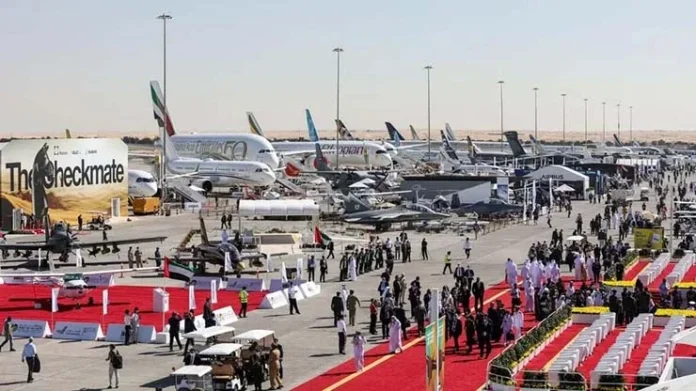Dubai / New Delhi: The quality and performance of engines manufactured by leading companies like Rolls Royce and GE came to the fore at the recent five-day Dubai Air Show which concluded on November 17 as debate raged over engine performance. With airlines keen on cutting costs by saving on fuel, having lowest possible maintenance costs, are seeing pressures building on those operating in sandy or dusty environments like the Gulf and India.
“Therein lies the problem for Rolls-Royce and Airbus, because this is the region that is buying these airplanes and will buy them in big numbers if the engine issue is resolved,” Emirates Airline President Tim Clark told reporters.
Clark who heads world’s largest international carrier was speaking in the midst of negotiations to buy dozens of Airbus A350-1000 jets powered by Rolls-Royce’s XWB-97 engine, which have foundered for now over maintenance and pricing issues. Emirates and Rolls papered over differences with a last-minute deal for a smaller quantity of the shorter A350-900, whose engine maintenance is seen as easier to predict.
In what is probably a rare case where a dispute virtually becomes public as engine makers want to be rewarded more for investments in new technology given the fuel savings they are offering to airlines on every mile of flight. GE Aerospace set the tone under CEO Larry Culp. “We’ll still look to find opportunities to be paid fairly for the value that we create,” he had told a media after half-yearly earnings in July.
Rolls-Royce CEO Tufan Erginbilgic, who took over in January this year, indicated the company will no longer write unprofitable contracts for the sake of winning new deals, having already provisioned 1.4 billion pounds in loss-making contracts.
According to analysts who have been closely following developments in the aviation sector, engine makers are paying for the hubris of past shows when they aggressively wooed airlines with conflicting promises of drastic fuel savings and trouble-free performance. The airline industry, which operates on more slender margins than many of its suppliers, isn’t generally sympathetic.
“I really don’t want to have airplanes that are going to be breaking down all the time. I happen to be a service,” Emirates President Tim Clark had stated. Rolls-Royce said it was looking at ways of improving durability but denied its XWB-97 was “defective”.
To achieve the fuel savings promised to airlines when the engines were sold, typically around 15-20%, they have to run hotter and push new materials to the limit. While the visible face of engine makers is technology, the way they generate much of their income resembles insurance. According to analysts, jet engines are typically sold at a loss but their designers make money on repairs and servicing spread over 20 years.
Rather than charge for repairs as they arise, engine makers increasingly strike long-term deals priced by the flight hour, agreeing to swallow the cost of planned and unexpected outages. An errant or maintenance-prone engine can become a financial time-bomb, said one industry executive. Emirates’ Clark said Rolls wanted to increase hourly pricing to adjust to such higher costs. Rolls-Royce declined comment on pricing.
Rolls now faces a quandary whether to invest more in the XWB-97 to help Airbus better compete with the Boeing 777X after Emirates ordered 90 more of the competing GE-powered planes. Refusing to do so would underscore Rolls Royce CEO Erginbilgic’s tough stand on profitability for investors, but risk leaving part of the wide-body market to Boeing and GE, and upsetting Airbus.
Some analysts think the cash would be better used elsewhere. “Rolls-Royce has ceased to chase market share at any cost: it has learned not to, and it no longer needs to,” Agency Partners analyst Nick Cunningham said.
Chief Customer Officer Ewen McDonald acknowledged that the company’s largest engine faced challenges in climates like Dubai, where Emirates has held off ordering the A350-1000. “The engine works really well in what we call benign operations … But in sandy, hot conditions it is challenged, as all modern engines are, because the temperatures are very high. We see it across the industry,” he said in an interview.
Emirates president Tim Clark earlier voiced concerns about the durability of the Trent 97-XWB and Rolls-Royce maintenance prices, a day after placing a major order for 90 Boeing 777X with rival engines from GE Aerospace.
GE Aerospace, a global leader in aviation technology, concluded participation at the Air Show on a high note, having announced multiple strategic engine and services orders. The event highlighted the importance of the robust regional aviation industry in the Middle East’s broader story of economic growth.
- Lawrence Culp, Jr., Chairman and CEO of GE and CEO of GE Aerospace, attended the event saying, “It was an eventful week for GE Aerospace and our partners at the 2023 Dubai Air Show with more than 450 engine orders as well as several services agreements announced. The airlines across this region are drivers of wider economic development, and we are proud to partner with them to shape the future of flight.”













